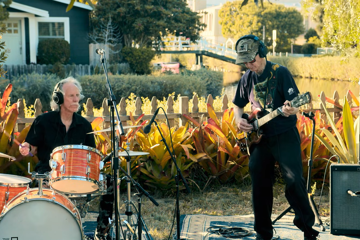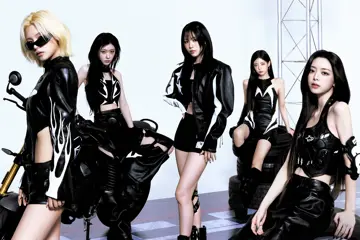MIDNIGHT OIL 1984

Most rockumentaries seem to exist solely for nostalgic purposes, turning the history of a beloved rockband into the cinematic equivalent of a microwave meal: compartmentalised, ready-to-eat, lacking in flavour. Given it wears a long-ago year in its title, and comes on the heels of a nostalgia-filled tour by its titular outfit, there’s little to suggest that Ray Argall’s Midnight Oil 1984 is going to be any better. Instead, it’s a genuine surprise, a film that succeeds where most rockumentaries fail: justifying its existence, shaking off the feeling of stodgy-history-lesson, and managing to convey what it was that made this music meaningful.
Though there are some scatterings of contemporaneous to-camera interviews — though only the band and their management, so we’re spared Bono-esque celebrity-talking-heads — to provide perspective and backstory, the majority of Midnight Oil 1984 is assembled from footage shot by Argall on a summer tour in late 1984; as much fly-on-the-wall observationism as heroes-on-stage concert footage. This is mixed with news reports that covered a concurrent event: Oils frontman Peter Garrett fronting a senatorial campaign for the Nuclear Disarmament Party; politicking by day, rocking by night.
This gives the film real drama and rich theme. Midnight Oil’s music is born out of post-punk’s nuclear paranoia, and, the album they’re touring behind, Red Sails In The Sunset, imagines Australia as post-apocalyptic wasteland. The marriage between music and politics is made all too literal when Garrett puts his money where his mouth is; the film a portrait of a moment — and, perhaps, nostalgic of a time — in which rock’n’roll was a genuinely form of cultural rebellion and activism, not some non-threatening leisure-pursuit. Here, kids, is a band “actually generating ideas that will engage debate”, as opposed to the tenor of current pop music, which is — to borrow a Seinfeldian phrase — nothing but sex and shopping.
So, we bounce between Garrett’s between-song banter — about Reaganomics, Cold War dick-swinging, and CIA South-American-dictator-bankrolling — and his work on the campaign trail, giving voice to conservationist ideals in opposition to the conservative political time. We see a band at the peak of their powers, and their singer wading into an old-fashioned media-climate of quaint political attacks.
Don't miss a beat with our FREE daily newsletter
The 1984 setting provides some amusing moments of recent-past kitsch: an office boasting telexes, rotary phones, and printing calculators; a high-tech ‘Election 84’ graphic on TV news coverage; and a host of amazing on-the-street vox pops of kids from a distant day. But instead of merely rhapsodising the past — talking-heads talking about how great the time or music was — Midnight Oil 1984 goes beyond such shopworn nostalgia.
It’s not some mere paean to an in-the-canon rockband, but a film imbued with the meaning of live-performance itself. People gather in crowds, at gigs, to participate in something bigger than themselves; which is, coincidentally, an idealistic reading of politics. Here, art and activism go hand-in-hand, each a forum for agitating for change.
BREATH

Breath is nostalgic for a different time, and type, of distant, macho Australiana: ’70s coastal towns, surf culture, and wild childhoods. Seeming far away from this helicopter-parent day, the kids in Tim Winton’s mythical rugged-Australia —14-year-old Samson Coulter and Ben Spence; BFFz with a healthy dose of rivalry— have free-run of their coastal hamlet, spending whole days wandering off, unsupervised, wherever they may. They’re drawn, as if by the pull of the tides, to the local shore; going from grommets to obsessives in the space of two coming-of-age hours; the film a study in male rites of passage, in macho competitiveness, and the ‘bravery’ meant to define traditional Ozzz masculinity. With a salacious dash of Elizabeth Debicki-centric autoerotic asphyxiation.
Adapting Winton’s novel to screen, debutante director Simon Baker —née Baker Denny; Home & Away graduate, watch salesman, handsome leading man— largely turns the lyricism of the writing into lyrical shots of environmental splendour. Whilst there’s familiar hallmarks of adolescent drama (first crushes and sexual experiences; library study and school socials; clueless parents at home and rebellious thrills in a whole-new-world) what’s best about the film is the shots that follow the kids into the ocean, soaking in the glories of white foam and blue waves. Sure, those shots may be the kind of things that populate surf videos, but given that so much of Breath is entangled in surfing mythos, capturing the power and wonder of the ocean may, actually, be the adaptation’s most important task.
CHAPPAQUIDDICK

There’s whole generations who know nothing of the Ted Kennedy scandal; a half-century having passed since the potential presidential candidate —the surviving brother of the assassinated John F. and Bobby— was involved in a car accident, at the titular Massachusetts island, that left a campaign secretary dead. 1969 has been endlessly presented, on screen as an epochal time: a new Age Of Aquarius birthed in its moonwalks, summers of love, and mud-splattered music festivals. But, in John Curran’s film, writers Taylor Allen and Andrew Logan portray the incident as the birthplace of modern-day political spin; the truth —and the law— mattering less than controlling the press-narrative, winning the PR battle, and surviving the trial-by-media.
Here, lil’ Teddy (Jason Clarke, resisting going the full Quimby, accent-wise) is the good-for-nothing third son; the hopeless deadshit who pales in comparison to his charismatic, canonised brothers. When he drives, drunk, off a bridge and into a canal, trapping just-lovely Kate Mara inside, it’s a fatal mistake, but, really, just another fuck-up. Regular notions of justice don’t apply to a Kennedy, however, and the cover-up soon on; entitlement, exceptionalism, cronyism, and wanton abuses of power all on parade. The silver-haired, navy-suited men who come in to play clean-up are the old-boys-network manifest; full of Rumsfeldian rhetoric and disinterest in moral conscience. Here, the current horrorshow of contemporary American politics is duly presaged: the truth rewritten, on the fly, by way of alternative facts.
TULLY

If a first-year creative-writing student turned in a story that ended, essentially, with ‘it was all a dream’, they’d be failed on the spot. So why is it that, as movie viewers, we’re supposed to accept final-reel reversals, twist endings, and ‘it was all in their minds!’ revelations? As a reviewer, you’re probably supposed to not even mention that there’s a final-act twist delivered in Tully —like, um, spoilerz, I guess— but, having seen the film, it’s all you can really talk about. The best kind of twist is one that adds another layer to all that’s come before, giving it double-meaning, enriched drama; perhaps, even, making it worth a repeat viewing. The final-act twist delivered in Tully is the worst kind: one that effectively ruins the entire film that comes before it, rendering the entire drama essentially meaningless.
The third collaboration between director Jason Reitman and screenwriter Diablo Cody —following 2007’s Juno and 2011’s Young Adult— is a study of the unglamorous, quotidian realities of parenthood. Charlize Theron has two school-age kids, and is, as they say, ‘heavily pregnant’ with a third. She’s hurried, harried, receiver of unwanted advice; her upstate-suburban life lightyears removed from those boozy 20-something years she spent living in a loft in Bushwick. One of the best, most insightful moments in Tully comes when we see that her ‘handful’ son kicking the back of her chair in the car isn’t just a difficult daily reality, but a source of anxiety so ingrained it’s infiltrated her nightmares. Once the baby has arrived, the routine of a newborn is made rapidfire montage: an endless procession of pumping, nursing, soothing, nappy-changing.
Theron’s life changes when her upwardly-mobile, bourgie brother Mark Duplass gives her the slightly-forceful gift of a ‘night nanny’, someone to tend to the baby in the midnight hours. When that nanny arrives, she’s Mackenzie Davis, who’s like Mary Poppins by way of Juno, a minor miracle-worker who seems, um, too good to be true; especially when she serves as fantasy-fulfilment sex-surrogate between Theron and her salaryman husband Ron Livingston.
From there, well, maybe the twist doesn’t seem so unexpected. But, for a film so attuned to —and out to make a portrait of— the realities of parenthood, the eventual revelation that this is all a fantasy seems like a betrayal of audience trust. Last time we saw Reitman, he was delivering pearl-clutching internet moralising in Men, Women & Children, and, perhaps, this third-act reversal is supposed to be its own moral moment: you don’t need some Manic Pixie Dream Nanny to survive as a mother, just self-belief! But it also unintentionally suggests the archaic connections between maternity and hysteria, and a rewarding friendship between women can only be the product of schizophrenic delusion.
ON BODY & SOUL

It’s the psycho-sexual, surrealist, abattoir-set Hungarian rom-com that you’ve been waiting for! In Ildikó Enyedi’s first film in 18 years, Alexandra Borbély is the socially-reclusive, touch-averse, Laura Marling-listening, detail-obsessed, on-the-spectrum shut-in who takes a job at a local slaughterhouse. Géza Morcsányi, the boss of the slaughterhouse, is an older gent who carries himself like someone wounded; once bitten, twice shy. The two meet-cute at the office when a visiting psychologist —out to finger a thief in their midst— hears them separately recount the same dream, suspecting that she’s been made a victim of their combined prank. In truth, this nocturnal phenomenon is a mystery to them.
In their dreamlives, they’re deer; wandering through a bucolic, snow-dappled idyll, drinking from crystal waters, gently nuzzling noses. What does it mean, then, that they’re sharing the same dream? Are they fated to be together? How does this other plane relate to the gruesome reality of their quotidian lives, going about their jobs at a site of blood-splattered butchery? Enyedi doesn’t, really, have any answers; instead leaving things open for interpretation. At the same time, for all the oddness of its premise, On Body & Soul also functions as conventional romance, a sweet portrait of two pathologically-shy people tentatively open up, turning isolation into unexpected connection.
BPM

When BPM screenwriters Robin Campillo and Philippe Mangeot were in their 20s, they spent time in the Parisian chapter of ACT UP, the activist outfit who turned AIDS protests into a form of political leverage; hoping not just to survive a plague, but change a society that considered them dehumanised victims. Across 143 minutes of history-as-it-happened, Campillo (Laurent Cantet’s co-writer, the director of Eastern Boys, and creator of the original Les Revenants) looks at those protesting in the early-’90s.
Though set over a quarter-century ago, Campillo’s film —steeped in his social-realist approach—feels particularly relevant, almost contemporaneous. In its many scenes of weekly group meetings, BPM authors a portrait of a community coming together, working things out through discussion, unafraid of dissent or contrary opinions. At a time in which far-leftism feels bogged down in dogma, it’s an uninspiring look at working for a common cause, mobilising to seize political power.
GERMAN FILM FESTIVAL
The German Film Festival opens nationally in late-May, bringing with it the kind of commercial-comedies and sentimental dramas that routinely clog these smaller festivals. Even scratching around the pointy edges reveals, largely, so-so pictures.
Paula, a surprising box-office success in its homeland, essentially brings two strains of period-piece together: the portrait of an artist, and the Free-Spirited Young Woman vs The Patriarchy drama. Its subject, Paula Mondersohn-Becker, was an early expressionist who fled the German countryside for Paris; falling with the fin-de-siècle set and crossing paths with Rilke; fighting against establishments both social and artistic. Sadly, this big, sweeping, costumed epic is laden with leaden theme, literally opening with an old man telling our heroine “women can’t become first-class painters!”
303 is an amiable roadtrip movie about a pair of Berliners —one campervan driver, one hitcher— heading out into journeys touched with past secrets, grief, familial baggage, etc. The best moments come when director Hans Weingartner (The Edukators) lets it just be a film about two people getting to know each other, but too often this moments of humanity are splashed with tonally-off flourishes of soap opera.
Whatever Happens is a study-of-a-relationship that begins with a pair of exes meeting in their old apartment on New Year’s Eve, only to launch into seven-years-ago flashback, and meetcute moment. Niels Laupert’s film is no drama, though, gambolling breezily through the years, caring little about reality; this one of those movies where the characters never get a different haircut, age, or have more than a handful of support-character acquaintances.
The best bet o’ the fest is probably Three Peaks, in which a quasi-family vacation becomes primal, in emotion, narrative, and family dynamic. Alexander Fehling plays the mountain-man who’s invited his new girlfriend (Bérénico Bejo) and her son to come hang at a log-cabin in the Italian Dolomites. The kid is pissed, though, at the arrival of this new father-figure; and their relationship comes to a head in some genuinely-tense lost-in-the-wilderness moments. There’s none of the satire of The Loneliest Planet or Force Majeure, but Jan Zabeil is coming at a similar idea: environmental vastness a setting to explore intimate relationship dynamics, and squirrely questions about masculinity.















